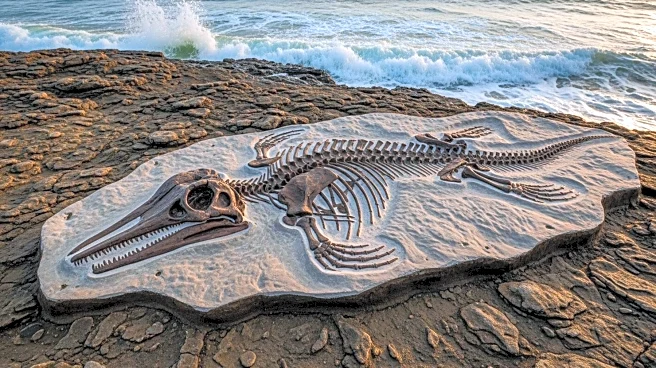What's Happening?
A near-complete skeleton of a new ichthyosaur species has been discovered on Dorset's Jurassic coast, identified as Xiphodracon goldencapensis, or the 'sword dragon of Dorset.' This dolphin-sized marine reptile, dating back 185 million years, is the only known example of its kind. The fossil was first found by a prolific fossil hunter at Golden Cap in Dorset in 2001 and later acquired by a museum in Canada. Recent analysis by experts, including Dr. Dean Lomax, has led to its classification as a new species. The ichthyosaur's skull features a large eye socket and a mark suggesting it may have been killed by a bite from a larger ichthyosaur. The discovery provides significant insights into ichthyosaur evolution, as fossils from this period are rare.
Why It's Important?
The discovery of Xiphodracon goldencapensis is crucial for understanding the evolutionary history of ichthyosaurs, marine reptiles that dominated the oceans millions of years ago. This particular specimen is the most complete individual found from its era, offering valuable information about the diversity and adaptation of ichthyosaurs. The unique features of the 'sword dragon,' such as its prong-like bone near the nostril and malformed limb bones, suggest it faced significant challenges during its life, including possible disease or injury. This finding enriches the scientific community's knowledge of prehistoric marine life and helps fill gaps in the fossil record, contributing to broader paleontological research.
What's Next?
Further research and analysis of the 'sword dragon' may uncover more details about its life and the environment it inhabited. Scientists could explore the implications of its unique features and the circumstances surrounding its death, potentially leading to new insights into predator-prey dynamics in the Mesozoic oceans. The discovery may also prompt additional fossil hunts along Dorset's Jurassic Coast, a historically rich site for ichthyosaur fossils, to uncover more specimens that could further illuminate the evolutionary history of these ancient marine reptiles.
Beyond the Headlines
The identification of a new ichthyosaur species highlights the ongoing importance of paleontological research in understanding Earth's history. It underscores the role of fossil hunters and museums in preserving and studying ancient specimens, which can lead to groundbreaking discoveries years after initial findings. This case also illustrates the collaborative nature of scientific research, involving experts from various institutions to piece together the life story of a creature that lived millions of years ago.










